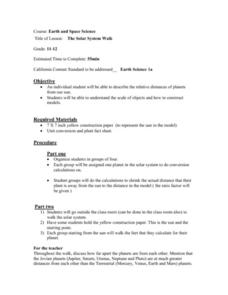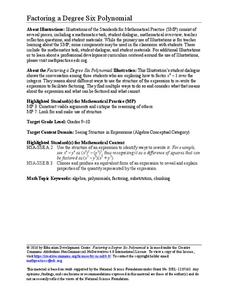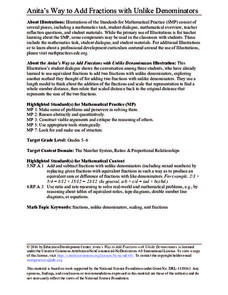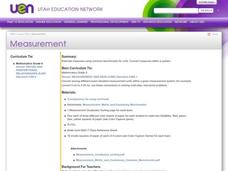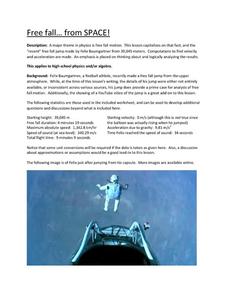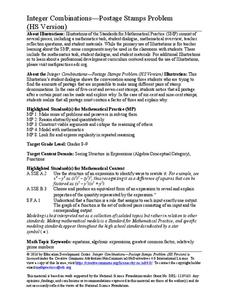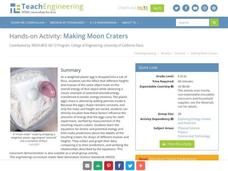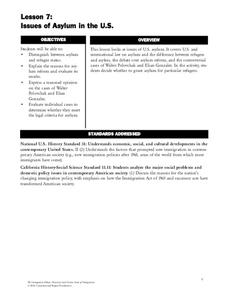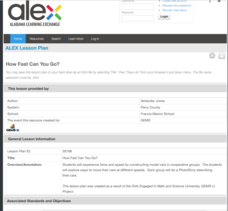Population Connection
The Carbon Crunch
Carbon is in the air; should we care? Teach the class why it is important to pay attention to carbon levels and how the world population and various countries across the globe affect the carbon levels in the atmosphere. High schoolers...
Curated OER
How Big is Barbie?
Students measure various dimensions of a male and a female dolls body and scale them proportionally to average human measurements. They calculate the appropriate scale factor (magnitude) to enlarge their doll and apply that scale factor...
Curated OER
The Solar System Walk
A unique lesson on the solar system, and some of the mathematics associated with it, is here for your high schoolers. Pupils are put into groups of four, and each group is assigned one of the planets from our solar system. They must...
Education Development Center
Factoring a Degree Six Polynomial
Within collaborative groups, scholars factor a degree six polynomial. They can factor the polynomial using many different strategies — a great way to prompt mathematical discussion.
Curated OER
Mass vs. Weight
Why do you weigh more in space? Each individual in your class explores this question and others as they determine the mass and weight of different objects using two types of scales. They perform conversions and discuss their results,...
Education Development Center
Anita's Way to Add Fractions with Unlike Denominators
Could you develop your own way to add fractions with unlike denominators? An in-depth task has scholars examine a fictional conversation between several people in which they discuss a method of adding fractions with unlike denominators....
Science Matters
Basic Needs
Scholars take part in a grand conversation about the basic needs of living things. Working collaboratively, pupils brainstorm and identify similarities to come to the conclusion that the environment meets the needs of all living things.
Curated OER
How Large is a Mole of M&M's
Students calculate whether or not a mole of M&M's fill their high school. They practice factor-labeling, define a mole, and calculate the number of cubic feet per mole of M&M's. To answer the question they measure and calculate...
Curated OER
Measurement
Students explore the concept of measurement. In this measurement instructional activity, students discuss what specific measurement tools such as an odometer measure. Students recite a measurement poem. Students make a foldable with...
Curated OER
Metric Conversions: Appropriate Units of Measurements
In this math learning exercise, students choose the appropriate unit of measurement in 12 problems. Students then convert metric units to larger or smaller measurements and also change metric to standard measurements.
Curated OER
Controlling the Pandemic: Public Health Focus
Students examine global issues centered around HIV and AIDS. In this health science lesson plan, students compare and analyze public health measures and factors that affect the treatment of HIV/AIDS. They examine the role of...
University of Wyoming
Free Fall…From SPACE!/Nanotechnology in the Classroom
Provide the details about Felix Baumgartner's sky jump from the far reaches of our atmosphere, 39,045 meters up! Then get your physics free fallers to evaluate the factors that played a role in his acceleration, the time to reach maximum...
Curated OER
Converting among Units
In this conversion worksheet, student use the factor-label method or unit analysis method to convert given measurements from one unit to another unit.
Indian Institute of Technology
Could King Kong Exist?
The title says it all: Could King Kong exist? Investigate how increasing the dimensions of an object affects its surface area and volume to mathematically conclude whether a creature with the weight and height of King Kong could actually...
Howard Hughes Medical Institute
What van Leeuwenhoek Saw
When van Leeuwenhoek saw cells and single-celled organisms for the first time, he knew these small things were a big deal! Share his discoveries with young learners through a narrated video, model-building activity, and scale study....
Education Development Center
Integer Combinations—Postage Stamps Problem (HS Version)
It seems the post office has run out of stamps! Learners build all the values of postage available if the post office only sells five- and seven-cent stamps. The task provides an opportunity to create an expression in two variables and...
Noyce Foundation
Sewing
Sew up your unit on operations with decimals using this assessment task. Young mathematicians use given rules to determine the amount of fabric they need to sew a pair of pants. They must also fill in a partially complete bill for...
Education Development Center
Integer Combinations—Postage Stamps Problem (MS Version)
Number patterns can seem mysterious. Help your learners unravel these mysteries as they complete an intriguing task. Through examination, collaborative groups determine that they are able to produce all integers above a certain value by...
Teach Engineering
Making Moon Craters
Create an egg-citing study of energy. Pupils investigate the effect of height and mass on the overall amount of energy of a falling object. The fourth segment in a six-part series on energy uses a weighted egg falling from different...
North Carolina State University
Exploring Genetics Across the Middle School Science and Math Curricula
Where is a geneticist's favorite place to swim? A gene pool. Young geneticists complete hands-on activities, experiments, and real-world problem solving throughout the unit. With extra focus on dominant and recessive genes, Punnett...
Constitutional Rights Foundation
Issues of Asylum in the U.S.
Who gets to come to the United States? Examine cases of individuals seeking asylum with an informative reading passage that includes examples, statistics, and representations of public opinion regarding asylum. Groups then go on to...
Curated OER
Ideal Gas Law
Students explain and use ideal gas law and use the law to solve problems. They use conversion factors to convert mass to mol. Also students use stoichiometry skills previously learned.
Curated OER
Breezy, Chilly, or Freezing?
Students assess the factors which influence the sensation of being "cold" in a particular situation. They study the complexities in measuring temperature by reading and discussing the article "Beyond Brrr: The Elusive Science of...
Alabama Learning Exchange
How Fast Can You Go?
Learners investigate force and speed. In this physics lesson plan, students construct model cars in small groups and perform experiments to identify what factors influence speed and force.
Other popular searches
- Metric Conversion Factors
- Unit Conversion Factors
- Chemistry Conversion Factors
- Recipe Conversion Factors
- Scale Conversion Factors
- Conversion Factors and Rate
- Conversion Factors Moles




